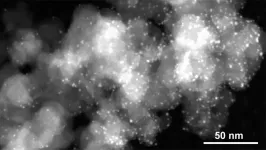(Press-News.org) COLUMBIA, Mo. -- For many nursing home residents, a trip to the hospital can be a jarring experience — one that leaves them confused and stressed. Yet avoidable transfers happen far too often, not only disrupting a resident’s routine but also costing the U.S. healthcare system $2.6 billion annually.
When researchers at the University of Missouri recently looked at the decision-making process for whether or not to transfer nursing home residents to the hospital, they quickly discovered that it’s complicated — particularly for residents with cognitive impairment who may not be able to communicate their preferences.
Kimberly Powell, an assistant professor in the Sinclair School of Nursing, led a recent study that found nursing home residents with Alzheimer’s disease or related dementias were more likely to have avoidable transfers to the hospital compared to residents without dementia. These transfers often stemmed from a mismatch between the care provided and the residents’ personal preference.
Powell pointed to the increasingly popular Age-Friendly Health System Initiative, which focuses on aligning care with what matters most to patients, emphasizing patients’ wishes and minimizing trauma and risk.
“Not all residents with dementia can tell the nursing home staff they don’t want to be transferred to the hospital, so our research highlights the importance of documenting advanced care planning for residents ahead of time,” she said. “Having those conversations early and often — ideally when a resident might be in an earlier stage of disease progression and better able to communicate their desires and values — helps us honor them through the rest of their life.”
For the study, Powell and her team analyzed data from the Missouri Quality Initiative, a $35 million program funded by the Centers for Medicare and Medicaid that embedded advanced practice registered nurses full time into 16 Missouri nursing homes with higher hospitalization rates than the national average.
“For those with a progressive disease like Alzheimer’s or dementia, we often find that they value having dignity later in life and being in a place that is comfortable while surrounded by people they know and love,” Powell said. “We also found that increasing nursing home staff support, training and resources can help residents receive the care they need as they age while remaining in the nursing home. We ultimately want to better support the staff who work in nursing homes.”
Ashley Woods, a doctoral student in the Sinclair School of Nursing and nurse practitioner at a hospital in New Mexico, encounters the issue firsthand.
“Sometimes, the patients’ forms are marked ‘do-not-transfer,’ so there seems to be a disconnect about the best course of action,” she said. “Those with dementia may experience a temporary episode of agitation in the nursing home, but by the time I see them in the hospital, everything looks good. Still, the transfers are often a traumatic and stressful experience for the residents and they don’t often align with the priorities and goals of the patient.”
Mentored by Powell, Woods’ research builds on the findings by exploring how frequently nursing home care teams address pain in residents with dementia.
“The work Ashley is doing around pain is so important and clinically meaningful,” Powell said. “Two-thirds of nursing home residents have cognitive impairment, and that number is only projected to grow in the years ahead, so this will become an increasingly relevant topic to monitor going forward. At the end of the day, we want the nursing home residents’ goals, values and preferences to be put ahead of anything else.”
“Untangling the complex web of avoidable nursing home-to-hospital transfers of residents with dementia” was published in Alzheimer’s & Dementia. Funding for the study was provided by the National Institutes of Health. The interdisciplinary research team included collaborators from the School of Medicine, College of Arts and Science and the MU Institute for Data Science and Informatics.
Mizzou — a leading research university and member of the prestigious Association for American Universities — has a strong track record in researching avoidable hospitalizations, including:
1. A $1 million grant Powell earned in 2022 from the National Institutes of Health to see whether texting could be used by nursing home staff to speed up decision-making and prevent the decline of residents’ health to ultimately reduce avoidable hospital transfers.
2. A 2022 study funded by the Centers for Medicare and Medicaid that found Black nursing home residents and those under age 65 are more likely to have repeat transfers to the hospital.
3. A 2021 study that found Missouri nursing homes saved $32 million by reducing avoidable hospitalizations.
Mizzou is the flagship, land-grant university in Missouri. Counted among the leading research universities in America, the university is a member of the prestigious Association of American Universities and the Southeastern Conference, the premier athletics conference in the United States. Mizzou is ranked No. 4 Best Value among public flagships in the U.S., according to U.S. News & World Report. Within six months, 95% of Mizzou graduates are successful by securing jobs or continuing their educational endeavors. Mizzou’s researchers make significant impacts on the world, including developing life-saving cancer treatments at the University of Missouri Research Reactor — the only one of its kind in the Western Hemisphere. Home to more than 31,000 students, Mizzou is located in Columbia, Missouri — consistently named one of the best college towns in the country.
END
Mizzou researchers aim to reduce avoidable hospitalizations for nursing home residents with dementia
A new National Institutes of Health-funded study finds nursing home residents with dementia are more likely to be involved in avoidable hospitalizations
2025-01-03
ELSE PRESS RELEASES FROM THIS DATE:
National Diabetes Prevention Program saves costs for enrollees
2025-01-03
About 1 in 3 adults in the United States have prediabetes, a condition where blood glucose levels are higher than normal, but not high enough to be diagnosed as diabetes.
Affecting 98 million adults, prediabetes can increase the risk of heart disease, stroke and type 2 diabetes.
While it can be reversed, 8 in 10 adults are unaware that they even have prediabetes.
To counter this growing problem, the National Diabetes Prevention Program was created by the Centers for Disease Control and ...
Research team to study critical aspects of Alzheimer’s and dementia healthcare delivery
2025-01-03
Kosali Simon, PhD, M.A., a professor with the Paul H. O’Neill School of Public and Environmental Affairs and a Regenstrief Institute research scientist; and Katherine Baicker, PhD, University of Chicago provost, will co-lead an expected nearly $16 million National Institutes of Health’s (NIH) National Institute on Aging (NIA) program to explore critical aspects of healthcare delivery for individuals living with Alzheimer’s disease and related dementias (ADRD).
This five-year research initiative aims to identify and address barriers to equitable and effective healthcare for this growing patient population. The ...
Major breakthrough for ‘smart cell’ design
2025-01-03
HOUSTON – (Jan. 3, 2025) – Rice University bioengineers have developed a new construction kit for building custom sense-and-respond circuits in human cells. The research, published in the journal Science, represents a major breakthrough in the field of synthetic biology that could revolutionize therapies for complex conditions like autoimmune disease and cancer.
“Imagine tiny processors inside cells made of proteins that can ‘decide’ how to respond to specific signals like inflammation, tumor growth markers or blood sugar levels,” said Xiaoyu Yang, a graduate ...
From CO2 to acetaldehyde: Towards greener industrial chemistry
2025-01-03
Acetaldehyde is a vital chemical used in making everything from perfumes to plastics. Today, its production largely relies on ethylene, a petrochemical. But increasing environmental concerns are pushing the chemical industry to reduce its reliance on fossil fuels, so scientists have been searching for greener ways to produce acetaldehyde.
Currently, acetaldehyde is produced through the so-called “Wacker process”, a chemical synthesis method that uses ethylene from oil and natural gas with other chemicals such as strong acids, i.e. hydrochloric acid. The Wacker process not only has a large carbon footprint ...
Unlocking proteostasis: A new frontier in the fight against neurodegenerative diseases like Alzheimer's
2025-01-03
Scientists have uncovered a powerful ally in the fight against neurodegenerative diseases: a nucleolar complex that plays a pivotal role in maintaining cellular health through protein homeostasis (proteostasis), by which cells maintain the balance and proper functioning of their proteins. By suppressing this complex, researchers have shown it’s possible to dramatically reduce the toxic effects of Alzheimer’s-causing proteins, boosting the cell’s natural defenses through enhanced degradation of hazardous proteins. This mechanism regulates proteostasis across tissues by modulating TGF-β signaling, a pathway involved in cell growth, differentiation, ...
New nanocrystal material a key step toward faster, more energy-efficient computing
2025-01-03
CORVALLIS, Ore. – Scientists including an Oregon State University chemistry researcher have taken a key step toward faster, more energy-efficient artificial intelligence, and data processing in general, with the discovery of luminescent nanocrystals that can be quickly toggled from light to dark and back again.
“The extraordinary switching and memory capabilities of these nanocrystals may one day become integral to optical computing – a way to rapidly process and store information using light particles, which travel faster than anything in the ...
One of the world’s largest social programs greatly reduced tuberculosis among the most vulnerable
2025-01-03
Brazil’s Bolsa Família Program (BFP), one of the world’s largest conditional cash transfer programmes, was responsible for the reduction of more than half the number of tuberculosis cases and deaths among those living in extreme poverty and indigenous groups, shows a large study coordinated by the Barcelona Institute for Global Health (ISGlobal), a centre supported by “la Caixa” Foundation, the Institute of Collective Health, and the CIDACS-FIOCRUZ in Bahia, Brazil. The findings, published in Nature ...
Surprising ‘two-faced’ cancer gene role supports paradigm shift in predicting disease
2025-01-03
UNDER STRICT EMBARGO UNTIL 10AM (UK TIME) FRIDAY 3 JANUARY 2025.
Peer reviewed | Observational study | Cells
A genetic fault long believed to drive the development of oesophageal cancer may in fact play a protective role early in the disease, according to new research published in Nature Cancer. This unexpected discovery could help doctors identify which individuals are at greater risk of developing cancer, potentially leading to more personalised and effective preventive strategies.
“We ...
Growing divide: Agricultural climate policies affect food prices differently in poor and wealthy countries
2025-01-03
“In high-income countries like the U.S. or Germany, farmers receive less than a quarter of food spending, compared to over 70 percent in Sub-Saharan Africa, where farming costs make up a larger portion of food prices,” says David Meng-Chuen Chen, PIK scientist and lead author of the study published in Nature Food. “This gap underscores how differently food systems function across regions.” The researchers project that as economies develop and food systems industrialise, farmers will increasingly receive a smaller share of consumer spending, a measure known as the ‘farm ...
New approaches against metastatic breast cancer: mini-tumors from circulating cancer cells
2025-01-03
Tumor cells circulating in the blood are the “germ cells” of breast cancer metastases. They are very rare and could not be propagated in the culture dish until now, which made research into therapy resistance difficult. A team from the German Cancer Research Center (DKFZ), the Heidelberg Stem Cell Institute HI-STEM* and the NCT Heidelberg** has now succeeded for the first time in cultivating stable tumor organoids directly from blood samples of breast cancer patients. Using these mini-tumors, the researchers ...
LAST 30 PRESS RELEASES:
Weight-loss wonder pills prompt scrutiny of key ingredient
Nonprofit leader Diane Dodge to receive 2026 Penn Nursing Renfield Foundation Award for Global Women’s Health
Maternal smoking during pregnancy may be linked to higher blood pressure in children, NIH study finds
New Lund model aims to shorten the path to life-saving cell and gene therapies
Researchers create ultra-stretchable, liquid-repellent materials via laser ablation
Combining AI with OCT shows potential for detecting lipid-rich plaques in coronary arteries
SeaCast revolutionizes Mediterranean Sea forecasting with AI-powered speed and accuracy
JMIR Publications’ JMIR Bioinformatics and Biotechnology invites submissions on Bridging Data, AI, and Innovation to Transform Health
Honey bees navigate more precisely than previously thought
Air pollution may directly contribute to Alzheimer’s disease
Study finds early imaging after pediatric UTIs may do more harm than good
UC San Diego Health joins national research for maternal-fetal care
New biomarker predicts chemotherapy response in triple-negative breast cancer
Treatment algorithms featured in Brain Trauma Foundation’s update of guidelines for care of patients with penetrating traumatic brain injury
Over 40% of musicians experience tinnitus; hearing loss and hyperacusis also significantly elevated
Artificial intelligence predicts colorectal cancer risk in ulcerative colitis patients
Mayo Clinic installs first magnetic nanoparticle hyperthermia system for cancer research in the US
Calibr-Skaggs and Kainomyx launch collaboration to pioneer novel malaria treatments
JAX-NYSCF Collaborative and GSK announce collaboration to advance translational models for neurodegenerative disease research
Classifying pediatric brain tumors by liquid biopsy using artificial intelligence
Insilico Medicine initiates AI driven collaboration with leading global cancer center to identify novel targets for gastroesophageal cancers
Immunotherapy plus chemotherapy before surgery shows promise for pancreatic cancer
A “smart fluid” you can reconfigure with temperature
New research suggests myopia is driven by how we use our eyes indoors
Scientists develop first-of-its-kind antibody to block Epstein Barr virus
With the right prompts, AI chatbots analyze big data accurately
Leisure-time physical activity and cancer mortality among cancer survivors
Chronic kidney disease severity and risk of cognitive impairment
Research highlights from the first Multidisciplinary Radiopharmaceutical Therapy Symposium
New guidelines from NCCN detail fundamental differences in cancer in children compared to adults
[Press-News.org] Mizzou researchers aim to reduce avoidable hospitalizations for nursing home residents with dementiaA new National Institutes of Health-funded study finds nursing home residents with dementia are more likely to be involved in avoidable hospitalizations



